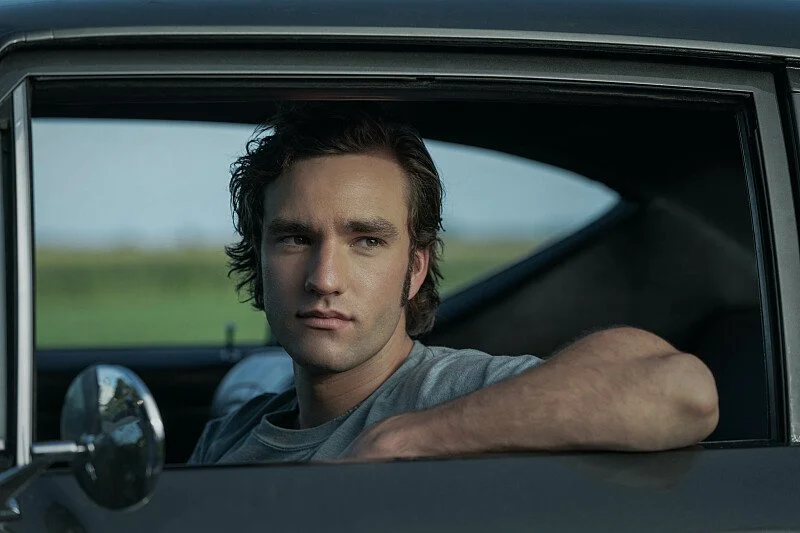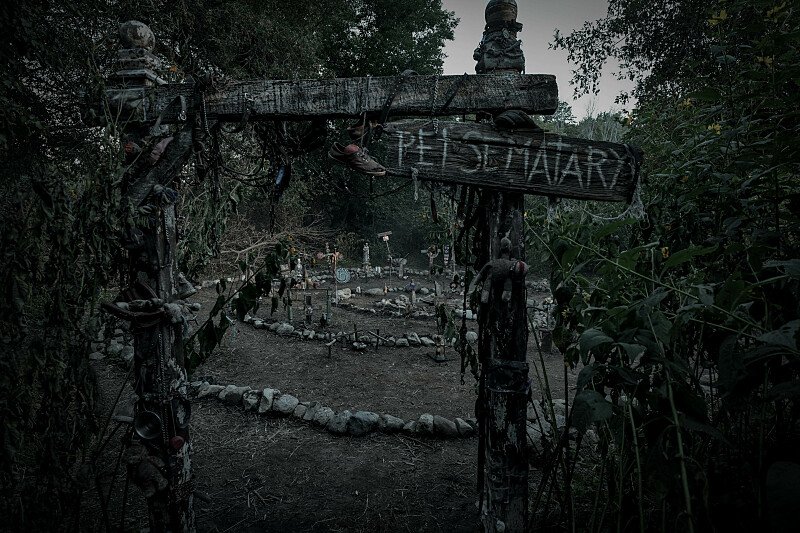Pet Sematary: Bloodlines Might Be Better Off Dead
A beloved pet returned from the grave molding and hateful. A child's death, a father's grief, and all the misery that follows. These are totemic, instinctual fears, the kind that made Stephen King’s Pet Sematary endure and that Mary Lambert's 1989 film adaptation made so viscerally upsetting.
Other memorable aspects of King’s story—the speeding truck, the sliced Achilles tendon, "Dead is better"—have become so calcified in its audience’s memory that the 2019 remake was forced to reveal that they'd switched which child died in the trailers before the movie even released. The newer adaptation added a spiral motif, creepy animal masks, and a more explicitly nasty and cruel ending, but it was still trapped in the shadow of the novel and the 1989 film.
With Pet Sematary: Bloodlines, director Lindsey Anderson Beer takes the reins of the franchise with a prequel following a young Jud (Jackson White, in a performance vacillating heavily between blank slate and withdrawn) in 1969, trying to leave his hometown of Ludlow with his young wife while dealing with the resurrected Timmy Baterman (Jack Mulhern). It's a movie-length version of the story that the elderly Jud tells Louis in the Pet Sematary novel and 1989 adaptation, with a few new flourishes—Timmy is now a Vietnam vet instead of fighting in World War II, and Jud, Timmy, and new character Manny (Forrest Goodluck) were childhood friends, adding a slightly more personal reason to return Timmy to the grave.
The time period hangs heavy over the film as Jud worries about getting drafted to Vietnam, Manny and his sister Donna (Isabella Star LaBlanc) discuss joining the American Indian movement in time to participate in the Occupation of Alcatraz, and hippies start to realize that the Age of Aquarius isn't turning out to be everything it was promised to be. These become the most engaging moments of the film, as Beer attempts to push her way out of the increasingly necessitated beats of a Pet Sematary adaptation: a few quasi-jump scares regarding a speeding truck, a character gets their Achilles tendon cut, the phrase "Dead is better" is uttered past the point of parody.
Even the visuals of the 2019 film get recycled back into Bloodlines with a kind of obligation that feels difficult to watch—Donna makes animal masks, a sunflower's pattern resembles a spiral, et cetera. It feels less like a film in a franchise connecting to previous installments and more like studio notes from executives worried that if the audience isn't constantly reminded that they're watching a Pet Sematary movie, they might think they're watching something new. It makes the audience want to get out of Ludlow as much as Jud and his wife do.
It's a shame, too, because those new moments are genuinely compelling. Jud's fear of getting drafted (and his increasing suspicion that his father pulled strings to keep him out of the war) culminate in a third act climax that subtly mirrors the visuals of Vietnam war footage. It's fairly rote at this point to have a Vietnam veteran "bring the war home with them," but by keeping that idea running in the background, Beer adds texture to a story that otherwise feels like a franchise setup. This theme feels in tune with the best of Stephen King's work, and some moments in the script even manage to capture the specific rhythms of his dialogue.
But when those franchise obligations pop up again, they're difficult to watch. Much like the Bookhouse Boys in Twin Peaks, Bloodlines reveals a secret society of Ludlow locals battling against the forces of evil (including, bizarrely, Pam Grier as a local mailwoman who appears in the film both more and less than you'd expect), although they don't do much in the film. Even David Duchovny's turn as a grieving father and accidental accomplice to his demonic son's crimes isn't given nearly enough time to shine, as the film seems too busy setting up the next required beat.
Ultimately, Pet Sematary: Bloodlines strains against carrying the weight of an accidental franchise, shambling past the the appropriate time for the film's story to end. Is it too on the nose to acknowledge that when it comes to Pet Sematary, maybe dead really is better?



Ziah is the founder and former editor-in-chief of the Hyperreal Film Journal. He can usually be found at Austin Film Society or biking around town.